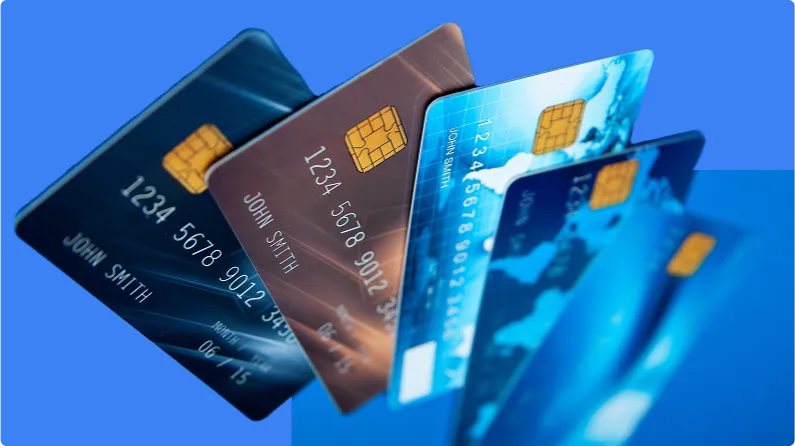On this page
When it comes to everyday spending, both prepaid cards and debit cards offer cashless convenience—but they work in very different ways. Whether you’re budgeting, traveling, or rewarding employees, understanding the unique features, pros, and cons of each card type is essential for making smart financial choices.
In this guide, we break down the key differences between prepaid credit cards and debit cards, explore their best use cases, and help you decide which option suits your personal or business needs best.
What is a prepaid Card?
A prepaid card is a payment card that you can load with funds in advance. Unlike a credit card or a debit card linked to a bank account, a prepaid card works on a "pay first, use later" basis. Once the funds are loaded, you can spend up to that amount at any merchant that accepts the card network (like Visa, Mastercard, or RuPay).
For example, popular options include:
- Visa and Mastercard prepaid cards, usable worldwide across online and offline merchants.
- Amazon gift cards, which allow prepaid spending specifically on Amazon.
- Travel Forex cards like Revolut or Wise, which are preloaded for secure international use.
- Paysafecard, offering prepaid codes for online transactions without sharing card details.
Pros of prepaid cards
Here are the pros for prepaid credit cards:
1.Control your spending: Prepaid cards can help control your spending because they limit your capacity to the amount you load onto the card. Unlike credit or debit cards, where you might exceed your budget, the loading feature of prepaid cards can prevent overspending.
Since you have a fixed amount, the money decreases as you spend and increases as you reload the prepaid card. If you get prepaid cards for your children, you can enable parental controls to monitor the transactions.
You’ll use this card exclusively for dining and groceries throughout the month. As the balance decreases, you must be more mindful of your expenses. You have a clear visual of your remaining budget, preventing you from spending more than you’ve allocated.
2. No bank account required: Unlike debit or credit cards, prepaid cards do not require a bank account, making them accessible to unbanked individuals. Prepaid cards are an option for people who don’t have access to regular bank-issued debit cards or credit cards.
3. Multiple money-loading options: You have multiple money-loading options with a prepaid card. Funds can be added through cash deposits, bank account transfers to prepaid cards, direct deposits, mobile app, reload at a store or financial institution that services prepaid cards and checks.
Cons of prepaid cards
Here are the cons for credit cards:
1. Fees: Most prepaid cards have fees, including:
- Activation fee – One-time charge for account opening, initial loading, or set-up
- Purchase fee – The upfront amount you pay to buy the card
- Reload fee – The charged amount when you reload funds onto the card
- Monthly maintenance fee – Monthly charges after you activate the card
- Inactivity or dormancy fee – You may be charged if you don’t make at least one transaction within a certain period
- Customer service fee – Some issuers may require customer service fees
These fees vary widely. Some issuers don’t have fees or offer ways to avoid them. For example, you can avoid the monthly maintenance fees if you maintain a sufficient balance or sign up for paycheck direct deposits.
2. It won’t help build credit
Unlike a credit card, prepaid cards won't help build your credit score if you aim to establish a responsible financial management track record. Prepaid cards do not report transactions to credit bureaus, making them unsuitable for credit score improvement.
With a credit card, your bank reports your transactions and credit utilization to the three major credit bureaus. When used responsibly, credit cards help improve your credit score.
3. Unable to spend more than the reloaded money
Users can only spend the preloaded amount, some prepaid cards now have overdraft protection and fees between $10 and $25 or more. These fees can be costly and unnecessary.
How to get a prepaid card?
Steps for getting a prepaid credit card-
- Compare your prepaid card options.
- Purchase one online or in person at a drugstore, supermarket, or big-box retailers like Target and Walmart.
- If necessary, register the card. Your identification must be checked before loading funds or withdrawing cash for reloadable cards. You can receive your card with your name on it.
- Load funds onto the card and start spending.
When should you use a prepaid card?
Prepaid cards are versatile financial tools, but they aren’t always the right fit for every situation. Here’s when using a prepaid card makes the most sense—whether for personal budgeting, gifting, or secure, hassle-free spending.
- You don’t have a bank account
Prepaid cards are ideal for those without access to traditional banking, offering a simple way to make digital transactions without a bank account. - You want strict spending control
Perfect for budgeting—you can only spend what you load, helping manage expenses or a teen’s allowance without overspending. - To send a gift or reward
Great for employee rewards, festival gifts, or personal presents, prepaid cards feel more thoughtful than cash and give recipients flexible spending power. - You’re traveling and want account safety
For international trips, prepaid travel cards keep your main account protected by limiting exposure to fraud and allowing you to load a set travel budget.
Who should choose a prepaid card?
Here’s who can benefit most from using one a prepaid card:
- Budget-conscious individuals – Helps control spending by limiting purchases to preloaded funds.
- Unbanked individuals – Ideal for those without a traditional bank account.
- Parents managing kids' expenses – Offers parental controls for monitoring transactions.
- Travelers – Provides a secure way to carry money without linking to a bank account.
- Gift-givers – Useful as a reloadable alternative to cash gifts.
Use cases for prepaid cards
Prepaid cards offer businesses flexible, secure, and efficient ways to manage payments and incentives. Here are some of the most impactful use cases for companies:
- Employee rewards & incentives: Companies use prepaid cards to recognize performance, distribute bonuses, or run spot recognition campaigns—making payouts instant and motivating.
- Marketing & promotional campaigns: Prepaid cards are popular for rewarding customers in marketing campaigns—whether it’s cashback, referral bonuses, or contest prizes—helping boost engagement and brand loyalty.
- Channel partner & distributor rewards: Ideal for incentivizing dealers, distributors, and sales agents with commissions, milestone bonuses, or loyalty rewards in a streamlined manner.
- Expense & budget control: Businesses issue prepaid cards to employees for travel expenses, client meetings, or fieldwork—enabling controlled spending and easy reconciliation.
- Freelancer & gig payments: Prepaid cards allow companies to pay gig workers, freelancers, or remote contractors without bank delays, especially in cross-border scenarios.
- Customer refunds & credits: Businesses offer prepaid cards as an alternative to cash refunds or store credits, providing flexibility and increasing the chance of future purchases.
- Event & trade show rewards: Organizations use prepaid cards to incentivize event participation, booth visits, or post-event surveys—driving higher engagement.
- Corporate gifting: Prepaid cards make excellent corporate gifts for clients or partners, providing a customizable and universally appreciated reward.
Send digital or physical cards across the globe, add your brand’s flair, set smart controls—and skip the messy logistics. No setup drama. No spreadsheet nightmares. Just click, send, reward, repeat.
What is a Debit Card?
A debit card is linked directly to your bank account. When you make a transaction, the amount is immediately deducted from your account balance. Debit cards provide access to your funds anytime for purchases or ATM withdrawals.
Pros of debit cards
Here are the pros of debit cards:
1. Straightforward application process
The debit card application process can be straightforward when you meet the requirements. You can apply online or in person, submit the requirements, and request a debit card.
However, the process can be challenging if you have a history of poor banking management. While banks are unlikely to check your credit when opening a checking or savings account, they could review your banking history.
The bank can decline your application if you have bounced checks and overdrafts or are reported on ChexSystems. In this case, prepaid cards may be your best option.
2. Cash withdrawals
Debit cards provide easy access to cash withdrawals through ATMs and bank branches.
This flexibility lets you convert your digital bank balance into cash when needed. As long as the ATM is within your card's network, you can withdraw funds without additional costs.
3. Discourages overspending
Like prepaid cards, debit cards help discourage overspending because your spending limit depends on your checking account balance.
If you're a young adult or new to financial management, a debit card can help you foster financial discipline and avoid credit card debt that damages your credit.
Additionally, you can access over 60,000 fee-free ATMs and monitor your expenses through real-time transaction alerts.
These perks will help you develop good financial habits. Since there are no fees to lament, you can easily manage your finances.
If you are a parent or guardian, you can also set up parental controls to monitor your children's transactions.
Moreover, tracking your spending is often more manageable because the charges reflect quickly on your account statement.
Cons of debit card
Here are the cons of a debit card:
1. It won't help build credit
Standard debit cards don't help build credit because they draw money on your funds instead of a lender's credit line.
Credit involves borrowing money through loans or credit cards, which you pay back with interest.
However, there are credit-building debit cards with a line of credit backed by external bank accounts.
In these cards, your account balance is the credit limit. After spending, the amount is deducted from your linked account.
Then, these payments are reported as repayments to the credit bureaus to build credit. Fintech companies often offer these types of debit-credit cards.
2. Transaction and overdraft fees
Although debit cards don't have annual membership and cash-advance fees, you may incur transaction and overdraft fees. When you withdraw from out-of-network ATMs, you'll pay transaction fees.
Meanwhile, if you register for overdraft protection and overspend, your purchase will incur overdraft fees. Your issuer may freeze or close your account until you repay the balance.
Other fees you may encounter include:
- Card replacement – Fees to replace a lost, damaged, or stolen card
- Insufficient funds – Fees for rejected transactions due to insufficient funds
- Foreign transaction – Fees for transactions with foreign currencies, typically three percent of the transaction amount
3. Not the best option for significant expenses
Debit cards are excellent for small purchases but not for significant expenses. They don't facilitate large transactions you'll need to pay with a credit card or over time, such as a VA loan. VA loans are mortgage loans designed for veterans, which can help finance your home-buying goals. This type of investment underscores the importance of choosing the appropriate financial tool based on short and long-term goals.
For example, home renovation is one of the expenses that you should avoid using a debit card for. This project often requires substantial upfront payments for labor, materials, and contractor services, which can quickly inflate to tens of thousands of dollars.
Debit cards are impractical for such transactions because of spending limits and the need for immediate access to large amounts of cash.
How to get a debit card?
Getting a debit card is typically straightforward if you have a bank account. Here’s a quick guide on how to apply and get started:
- Compare banks' debit card offers and choose one with minimal fees.
- You can create a checking account online or in person. You'll need to provide proof of identity and other required documents, such as your driver's license, Social Security number, taxpayer identification number, passport, birth certificate, and proof of address (bank statement or utility bill).
- Request a debit card. You can receive it in person or have it delivered.
- Once received, activate the card and start depositing or spending.
When should you use a debit card?
Debit cards are best suited for everyday banking needs and frequent transactions. Here’s when choosing a debit card makes the most sense:
You need regular access to your bank funds
A debit card offers easy, instant access to your bank account for ATM withdrawals and daily purchases.
You want to avoid reloading funds
Debit cards pull directly from your bank, so there’s no need to preload or manage separate balances—ideal for convenience.
You make frequent purchases
For regular online or in-store shopping, debit cards ensure quick, smooth transactions linked to your available balance.
You want banking perks and tracking
Linked to your account, debit cards provide extras like spend tracking, alerts, cashback, and overdraft protection, keeping your finances organized.
Who should choose a debit card?
Debit cards are ideal for individuals who need easy, regular access to their bank funds. Here’s who can benefit most from using one:
- Individuals with a bank account – Requires a linked checking account for transactions.
- Those who want overdraft protection – Some debit cards allow overdrafts with fees.
- Users looking for broader financial access – Supports recurring payments, ATM withdrawals, and direct deposits.
- People aiming to build financial history – While it doesn't build credit, responsible use improves financial habits.
- Frequent online shoppers – Offers fraud protection and secure transactions.
Use cases for debit cards
Debit cards are widely used for everyday transactions and banking needs. Here are key scenarios where debit cards prove most practical and convenient.
- Everyday purchases: Best for routine spending like groceries, dining, and bills.
- ATM withdrawals: Quick access to cash anytime.
- Subscription payments: Good for recurring transactions tied to your bank account.
- Bill payments: Easier tracking of utilities and regular payments.
Key Differences: Prepaid card vs debit card
While both prepaid cards and debit cards allow cashless transactions, they work differently. Here’s a quick breakdown of their key differences to help you choose the right option.
Rewards comparison: Prepaid card vs. debit card
When evaluating rewards and incentives, it's essential to consider the following aspects:
If you’re a business owner or employer, you can provide Plum prepaid cards to your customers or employees. These cards have fee-free payouts that can scale up your rewards campaigns, employee incentives, and customer loyalty programs.
In 2023, G2 Crowd awarded Xoxoday Plum as the best rewards and incentives software.
Make financially smart choices
Prepaid and debit cards both offer unique advantages—whether it's budget control or seamless access to your bank funds. But when it comes to rewards and incentives, not all cards are created equal. That’s why it’s crucial to look beyond the basics and choose a card that aligns with your spending habits and lifestyle goals. As such, understanding the terms and conditions ensures you choose the right card that aligns with your lifestyle and spending habits.
With Xoxoday Plum, you don’t just get prepaid cards—you unlock a world of curated rewards, personalized gifting, and seamless integrations. Whether you’re rewarding employees, engaging customers, or powering loyalty programs, Plum's flexible prepaid solutions make every transaction meaningful.















